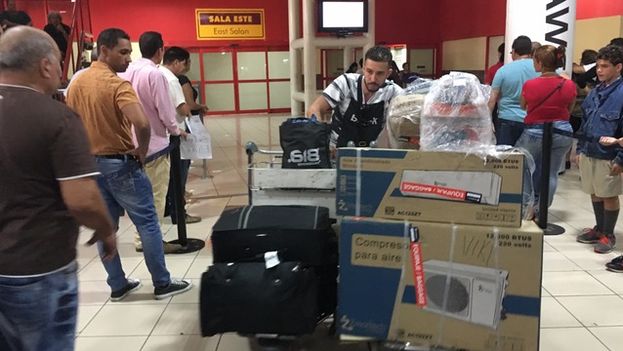
![]() 14ymedio, Generation Y, Yoani Sanchez, Bogota/Havana — Flight 254 climbs over Bogota on a cold, gray morning. Inside the plane members of the Cuban delegation is traveling back to Havana, after participating in the Central American and Caribbean Games held in Barranquilla, Colombia. For more than three hours, the restless athletes fill their area of the craft with conversations — which cross from one side of the aisle to the other — and that revolve, basically, around one issue: the purchases they have made to take home to the Island.
14ymedio, Generation Y, Yoani Sanchez, Bogota/Havana — Flight 254 climbs over Bogota on a cold, gray morning. Inside the plane members of the Cuban delegation is traveling back to Havana, after participating in the Central American and Caribbean Games held in Barranquilla, Colombia. For more than three hours, the restless athletes fill their area of the craft with conversations — which cross from one side of the aisle to the other — and that revolve, basically, around one issue: the purchases they have made to take home to the Island.
Other travelers flying on Avianca Airlines, on Tuesday, encountered more than twenty athletes dressed in blue uniforms marked with the flag with the single star. The composition of the group was heterogeneous. They were young people in perfect physical shape who evidently participated in the competitions; others with gray hair and the appearance of coaches, and third parties who were neither one nor the other, but who acted as guards.
As the plane broke through the dense layer of clouds over the Colombian capital a question broke the hypnotic silence of the ascent. “Hey, were you able to buy the split (air conditioner)?” an athlete sitting in row 11 loudly asks another, three rows back. The answer was also loud enough for everyone to hear. “Yes, I bought it with no problems, and also the bicycle and the parts that I need for the bike.” The brief dialogue triggered an avalanche of comments in the same style.
During the entire time the plane spent in the air, the group did not exchange a single word about the sports competition, the medals won, or the hard struggle for Cuba to come in second, after having lost the event’s scepter for the first time in almost fifty years. The contest they discussed was another. The protagonist was the game against the clock to be able to “leave the village and reach the markets” nearby, according to one of the athletes, or “to find where they sell things more cheaply to make the money stretch,” said another.
The jackpot, what really excited them and elicited grins, was not, for many of these young talents, to win the gold, silver or bronze, but to be able to return home with products and devices that will improve their quality of life. One boasted of having been able to “lift the suitcase a little bit with my hand” so that it did not register its whole weight during the airline check-in.
“I told the employee that they were bicycle parts although they are for a motorbike because it is easier to get them through,” boasted another. “They let me bring three suitcases and the extra they charged me I will get back quickly, because everything I brought is worth a lot more in Havana,” added an older man who seemed to be the manager of some sport. Beside him, a man with a military haircut and the same sports suit as the rest of the delegation listened without opening his mouth, but the backpack he had placed in the overhead compartment could barely be closed.
The plane began to circle over Havana. “We have to wait because we have been informed that the airport is closed for operations,” the captain informed the plane. While the passengers peered out through the windows at the same landscape repeated over and over, the athletes exchanged the latest recommendations for dealing with their luggage. “I’m going to pass the screening because I still do not have an import for this year, but I need you to take through the two phones I brought,” he asked one of his row mates.
Finally, the flight touched down and after the long line for immigration came the most anticipated moment for the anxious athletes: picking up their luggage on the belt. On one side of the conveyor, an employee of Customs shouted loudly that the AC units and televisions must exit through a small door that leads to the room where they scan each package to check its interior. The sports delegation was completely crammed in there.
Then an air conditioner came out, followed by another and then several more. The boxes were piling up, smiles lit faces, some took selfies in front of the growing mountain of appliances. Still, nobody was talking about medals.
It was time to exit to José Martí International Airport’s crowded waiting room. There were whole families waiting with babies or the elderly in wheelchairs. Screams, commotion and a woman in tears telling an athlete that seemed to be her son: “I knew you were going to bring it,” as she touches the box with the air conditioner with the relief of who imagines nights without sweating in a room kept in the comfortable 70s.
The scene repeats itself. The members of the sports delegation are hugging their relatives and distributing the first gifts. The tourists who have arrived on the same flight understand less and less. “Why do they have to bring those things?” asks a surprised Chilean who has come for a cousin’s bachelorette party. Nobody answers him.
__________________________
The 14ymedio team is committed to serious journalism that reflects the reality of deep Cuba. Thank you for joining us on this long road. We invite you to continue supporting us, but this time by becoming a member of 14ymedio. Together we can continue to transform journalism in Cuba.
